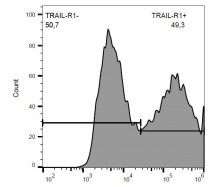ARG53804
anti-CD261 / TRAIL R1 antibody [DR-4-02] (FITC)
anti-CD261 / TRAIL R1 antibody [DR-4-02] (FITC) for Flow cytometry and Human
Cell Biology and Cellular Response antibody; Cell Death antibody; Immune System antibody
Overview
| Product Description | FITC-conjugated Mouse Monoclonal antibody [DR-4-02] recognizes CD261 / TRAIL R1 |
|---|---|
| Tested Reactivity | Hu |
| Tested Application | FACS |
| Specificity | The clone DR-4-02 recognizes TRAIL-R1 (DR4), a human death receptor 4 (468 amino acids) expressed in most human tissues (spleen, peripheral blood leucocytes, thymus) and in a variety of tumour-derived cell lines. |
| Host | Mouse |
| Clonality | Monoclonal |
| Clone | DR-4-02 |
| Isotype | IgG1 |
| Target Name | CD261 / TRAIL R1 |
| Antigen Species | Human |
| Immunogen | Fusion protein containing the extracellular part of TRAIL-R1 and the constant part of the heavy chain of the human IgG1. |
| Conjugation | FITC |
| Alternate Names | TNF-related apoptosis-inducing ligand receptor 1; CD antigen CD261; TRAILR-1; DR4; Tumor necrosis factor receptor superfamily member 10A; CD261; Death receptor 4; APO2; TRAIL receptor 1; TRAIL-R1; TRAILR1 |
Application Instructions
| Application Suggestion |
|
||||
|---|---|---|---|---|---|
| Application Note | * The dilutions indicate recommended starting dilutions and the optimal dilutions or concentrations should be determined by the scientist. |
Properties
| Form | Liquid |
|---|---|
| Purification Note | The purified antibody is conjugated with Fluorescein isothiocyanate (FITC) under optimum conditions. The reagent is free of unconjugated FITC and adjusted for direct use. No reconstitution is necessary. |
| Buffer | PBS, 15 mM Sodium azide and 0.2% (w/v) high-grade protease free BSA |
| Preservative | 15 mM Sodium azide |
| Stabilizer | 0.2% (w/v) high-grade protease free BSA |
| Concentration | 0.1 mg/ml |
| Storage Instruction | Aliquot and store in the dark at 2-8°C. Keep protected from prolonged exposure to light. Avoid repeated freeze/thaw cycles. Suggest spin the vial prior to opening. The antibody solution should be gently mixed before use. |
| Note | For laboratory research only, not for drug, diagnostic or other use. |
Bioinformation
| Database Links |
Swiss-port # O00220 Human Tumor necrosis factor receptor superfamily member 10A |
|---|---|
| Gene Symbol | TNFRSF10A |
| Gene Full Name | tumor necrosis factor receptor superfamily, member 10a |
| Background | TRAIL-R1 (CD261, DR4) is a type I transmembrane protein, also called TRAIL receptor 1. The ligand for this DR4 death receptor has been identified and termed TRAIL, which is a member of the TNF family. DR4, as many other receptors (Fas, TNFR1, etc.), mediates apoptosis and NF kappaB activation in many cells and tissues. Apoptosis, a programmed cell death, is a operating process in normal cellular differentiation and development of multicellular organisms. Apoptosis is induced by coupled of certain cytokines (TNF family - TNF, Fas ligand) and their death domain containing receptors (TNFR1, Fas receptor). |
| Function | Receptor for the cytotoxic ligand TNFSF10/TRAIL. The adapter molecule FADD recruits caspase-8 to the activated receptor. The resulting death-inducing signaling complex (DISC) performs caspase-8 proteolytic activation which initiates the subsequent cascade of caspases (aspartate-specific cysteine proteases) mediating apoptosis. Promotes the activation of NF-kappa-B. [UniProt] |
| Research Area | Cell Biology and Cellular Response antibody; Cell Death antibody; Immune System antibody |
| Calculated MW | 50 kDa |
Images (1) Click the Picture to Zoom In
Clone References








